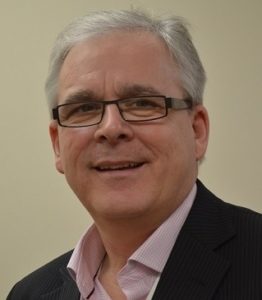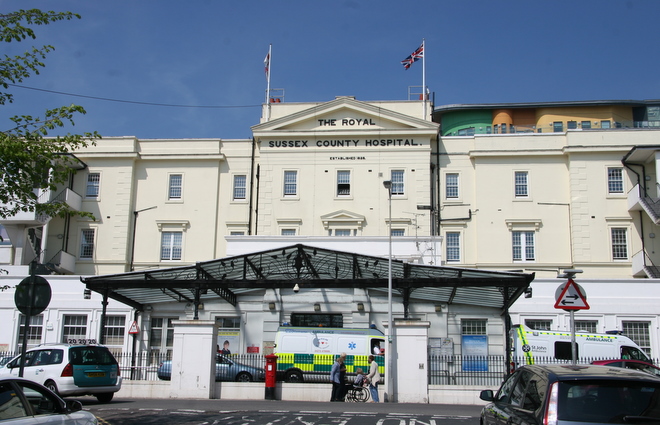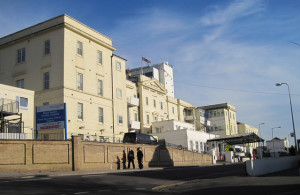The NHS trust that runs Brighton’s main hospital is in crisis as it prepares to receive a critical report from the Care Quality Commission (CQC).
More turmoil at the top of the trust is expected as bosses also grapple with a worrying financial deficit while the £485 million modernisation of the Royal Sussex adds to the challenges.
Some inside the trust fear that the third chief executive in nine months may be about to leave – under duress and as a scapegoat for the failings of her previous trust.
Gillian Fairfield became chief executive of Brighton and Sussex University Hospitals NHS Trust in April – on secondment from the troubled Pennine Acute Hospitals NHS Trust.
She came to the Brighton trust (BSUH) with a reputation for having turned round poorly performing trusts in her previous posts.
And some colleagues believe that she had started to get to grips with some of the intractable problems that have adversely affected the patient experience and financial performance of the Brighton trust.
The CQC arrived in her first week in charge of BSUH, which runs the Royal Sussex County Hospital, the Royal Alexandra Children’s Hospital and the Sussex Eye Hospital among others.
Ten weeks later – as work on the CQC report continued – the official watchdog served the trust with a warning notice. Also known as a section 29a notice, they are issued when “significant improved is required”.
BSUH said: “The notice requires the trust to make significant improvements to the quality and safety of care and privacy and dignity of both inpatient and outpatients in a number of key areas.
“It also highlights a failure to provide treatment and care that is in line with national timescales and standards.”
When the CQC publishes its full report – it is due out on Wednesday (17 August) – the inspectors’ verdict is not expected to make happy reading. The trust will almost certainly be rated inadequate and placed in special measures.
On Friday (12 August) the CQC published a report on Dr Fairfield’s previous trust. Pennine Acute Hospitals was rated inadequate, along with its leadership.
Some in the NHS want Dr Fairfield to accept responsibility for the trust’s failings and resign – or face being recalled from her secondment to Brighton and be suspended or sacked.
It would suit those currently heading her former trust although one NHS insider described the prospect as “a ritual sacrifice – and a pointless one at that”.
Although Dr Fairfield spent two years at the Pennine trust, the CQC report appears to be positive about her performance and the changes that she was trying to bring about. And there are some similarities with the challenges in Brighton.

“The secondment of the CEO to manage another trust was announced during the inspection and the chair’s tenure also came to an end at the time of the inspection.
“Staff were very positive about the visibility and responsiveness of the former chief executive (recently seconded) and the chief nurse.
“Staff felt that they both listened to concerns and took action to address them where possible. Staff stated that historically this had not always been the case and that in the past the raising of concerns was not encouraged.
“Staff told us that historically the culture in the trust had been quite closed and the raising of concerns and ideas was not supported or encouraged.
“Staff felt that the culture had (until recently) focused on financial matters and operational delivery rather than service quality.
“Since 2014 the trust had been working on developing and encouraging a more open and inclusive culture where staff raise issues and concerns without blame.
“In many services including community services we found that there was a positive culture emerging where staff felt well supported by their managers and colleagues and were positive about service changes and improvements.
“Staff reported being better heard and valued by the organisation and were positive about the new ways of staff engagement.”

The CQC chairman David Prior – also known as Lord Prior and now Health Minister – came to the Royal Sussex to discuss the issue of racism two years ago.
But there remain concerns that the board has not given adequate leadership in this sensitive area or even addressed the matter in its meetings in public despite at least one member raising the issue.
The trust’s financial position has also worsened. At the last board meeting held in public the year-to-date deficit was £11 million.
Deputy chief financial officer Bill Stronach said in a report: “If the financial position continues … the year-end deficit could approach £70 million.”
However, his forecast is for a year-end deficit of £15.6 million. Consultants from McKinsey’s have been brought in to help the trust try to make the necessary savings to achieve this.
They are looking to cut £48 million from the £550 million revenue budget. This is expected to mean fewer staff as pay is a big part of the hospital’s running costs.
At the same stage last year the trust was in a better position – a year-to-date deficit of £7.5 million – and was confident of sticking to an “agreed” year-end deficit of £19 million. The optimism was misplaced and it ran up a deficit of more than twice that sum.

BSUH is far from being the only trust grappling with a financial deficit. Last week the board met in private at the American Express Community Stadium, with the financial challenges among the items up for discussion.
The CQC criticised directors at Dr Fairfield’s previous trust – the Pennine Acute Hospitals – for not being sufficiently challenging.
The board at Brighton has recently lost two of its most effective and challenging non-executive directors – Christine Farnish and Farine Clarke.
And the long experience of chairman Julian Lee and chief nurse Sherree Fagge have also been lost. He has retired, with no permanent replacement yet, and she has moved to another NHS organisation, NHS Improvement.
The former chief executive Matthew Kershaw left at Christmas, moving to a Kent trust closer to his home and family and where he worked previously.
His successor Amanda Fadero served three months as acting chief executive before Dr Fairfield was seconded to Brighton.
The boardroom changes have increased the difficulty in dealing consistently with problems like the waiting times in the Accident and Emergency (A&E) Department.

It affects ambulance handover times too, with paramedics tied up outside A&E rather than heading off to deal with other 999 calls.
The ambulance trust – the South East Coast Ambulance Service (Secamb) – has also received a section 29a warning related to its own shortcomings.
And the Brighton and Hove Clinical Commissioning Group – the local CCG or health commissioners’ organisation – was graded inadequate by the CQC less than a month ago.
The CQC previously said that the Royal Sussex required improvement, when it reported two years ago.
Inspectors will have assessed the effectiveness of the board during the visit in the spring and looked at the culture within the trust.
But it remains to be seen whether they will have worked out why, for example, the rate of missed appointments is so high – well over a thousand a month – costing millions of pounds a year.
Some are down to patients but by no means all – and, despite the cost, it is another significant matter that doesn’t appear to have made it on to the agenda of the board meetings in public.
Are the consultants always available when needed? Certainly in A&E they put in the hours – 24 hours a day and seven days a week.
The patient “flow” through the hospital – not always as good as it should be – has prompted questions about whether the same can be said for other areas.
Some patients – when they have the clinical and financial luxury of having the choice – have been going private with consultants who also work at the Royal Sussex. What monitoring takes place?
With the hospital in crisis, and the chief executive’s future in doubt, it remains to be seen who will put things right.
But whoever it is will have the symptoms set out in the CQC report as a starting point. He or she will need incredible determination to drive through the changes necessary to match the incredible investment – almost half a billion pounds – in the fabric of the Royal Sussex.
With hospital buildings finally set to be fit for the 21st century, the management and medical leadership will need to provide a service to patients about which the same can be said.










The increasingly onerous burden of Sussex University and Brighton University expansions is without question a factor in the A&E situation where drug and alcohol induced illness and injury are concerned. That and the foreign language student and clubbing emphasis of the nightime economy are driving A&E demand.
Not only is A&E used by them when they overdose on these things, but as a GP service – as they are not permanent residents and do not have a registered GP of their own.
How many of the mega thousands that visit the city for a day on the beach end up in A&E? I do wonder about that pressure too.
Perhaps the universities, crammers and language schools should be required to pay for any of their students who pitch up at A&E in future, many of whom now are very, very rich foreign students.
As a renal patient, I have over 26 years had occasionally to go to A&E for one reason or another, and the changes I have noticed are plain terrifying for someone in my situation. Everyone turning up now in an organically unwell state is automatically treated as a possible druggie. It is almost like you have to prove you arn’t there for a recreational drug related reason.
I never feel safe there. Ever. And in 2011 and again in 2012, my transplant was put in peril by inappropriate handling of my situation over a 24 hour period before I was admitted to the ward. I was treated like a criminal.
Well, this can only be described as a complete mess! Overpaid executives riding the gravy train, ‘ consultants’ probably being paid more than they save. Money disappearing faster than water down the drain. Building sites everywhere, waiting times up, a&be filled up with inappropriate patients. Yes, it’s a real mess!
But, for all that the RSCH has saved my life more than once over the years, and the care I have received has never been less than brilliant.
If the end result of hospital visits is to come out in better condition than one went in then the NHS as a whole and The RSCH in particular do a fine job under increasing financial pressures.
It is to be hoped that these difficulties are resolved but it does require patients not to use the service needlessly and to give their full support to a great local institution.
Don’t know how final the new design is but why not split A&E into two – medical problems turn left, druggies and drunks turn right?
This isn’t crossroads you know, it is a place of medical care
Having both parents as Cancer patients and Royal Sussex – and nurmerous a&e visits mostly late at night – early hours – I would agree with a separate waiting room for those students/tourists/regulars that have overdosed on substances/alcohol to those that are sick for other reasons – there really is nothing worse that having a drunk dribbling, shouting etc when I had my Mother suffering from Sepsis after a chemo treatment. Please look into this. As with a&e consultants – yes there are always consultants in a&e but no-one from oncology who works in a&e which seems strange when you have the biggest cancer centre now – and so many cancer patients need to visit a&e during their chemo treatments due to infection….yet they get held in a&e overnight until approx 11am an oncology doctor pops in!!! We experienced this every time – 5 times in total!
A&E is where medical school graduates get their first real jobs in order to see a wide variety of problems and hone diagnostic skills. There is a dedicated A&E Consultant (the one I had the misfortune to meet in 2004 looked/behaved like an arrogant student…could not BELIEVE he made Consultant)and he thought valium an appropriate treatment for Meniere’s which is an inner ear debris issue that sends balance into chaos and the world spins…. It isn’t.
You had to wait for the morning because Consultants keep 9-5 type hours except for whoever is on ward duty (maybe), but who COULD be asked to come to A&E for a quickie if possible…which would leave the ward without them….assuming one is on the ward and not just on call.
A&E is not staffed by specialists. A kind of souped up GP service using students, in my view.
Mother in law been waiting 3 months to find out what the ‘mass’ on her hip is. The hospital were supposed to discuss 10th Aug. When a call was made to find out what the outcome was were told they ran out of time and need to wait another week. Still no idea and now she’s back in hospital after an ambulance didn’t turn up after 12 hour wait. So ridiculous
“They are looking to cut £48 million from the £550 million revenue budget. This is expected to mean fewer staff as pay is a big part of the hospital’s running costs.”
So they recognise that the hospital is not working and their solution is to cut staff even further??
Community beds and community care has been cut, meaning people cannot be discharged in a timely manner – they have to wait and wait and wait until a package of care can be organised.
Newhaven Rehabilitation centre – working perfectly well 3 years ago, taken out of commission = not enough beds in the community for those patients not well enough to go home = Commissioning beds in private nursing homes (The Victoria’s)= increase costs – reopening Newhaven as a short stay hospital; didn’t work, now closed again. Still no new beds opened in the community.
What a bunch of cowboys.
3 years and I am still waiting for my ‘appointment’ following an internal investigation – endoscopy etc. The appointments are made and then they cancel them ………. a real shite service, even the results that they sent to my GP are incomplete and still awaiting the full report!
The fact the NHS Trust is being described as being in dept over so many years just shows that the NHS Trust has been UNDER FUNDED for a long time.
Doctors and nurses etc can only work with what they have, if there is no room in A&E then accepting them on a trolley in an open area is surely better than turning them away in which case some people could face a fatality.
If there is bed blocking, that is not because we decide to keep patients in beds and no t want them to go home….come on, use your brain on this… if we can move patients on we do because we need the beds continuously.
We are desperately understaffed and we do the best we can and it is a shame we get condemned for things that are not in our control.
I am sure there are failings but a bit of realism is needed here.
We are underpaid, we have not had a pay rise apart from the 1% last year but the the N.I went up so we were worse off. This is terrible as inflation goes up every year yet our money stays the same. So realistically we are worse off each year.
I have every empathy for all patients and their families for any negative experiences they have endured, this is not acceptable and sadly this happens world wide.
CQC report puts BSUH into special measures. What does that mean? Can we now expect better service from our hospitals, if so how? CQC have praised aspects of the service, have the BSUH management team found out how there were pockets of excellence? Are they implementing the way these excellent services work throughout the trust?